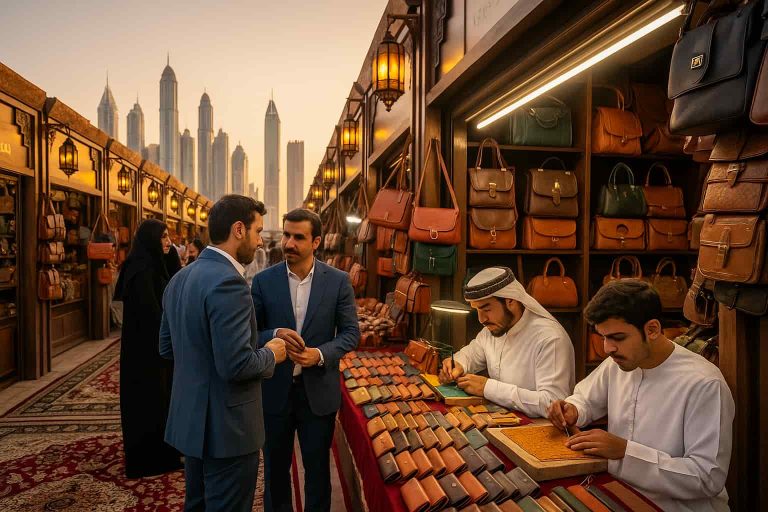Market Analysis and Opportunities
Hand-stitched leather goods production represents a distinctive business in Dubai, offering handmade artistry, bespoke design, and premium quality in a region renowned for luxury and craftsmanship appreciation. The UAE, and especially Dubai, is a thriving market for high-end accessories, where discerning consumers seek unique products that combine heritage techniques with modern elegance. This sector aligns perfectly with Dubai’s positioning as a global hub for luxury retail, creative industries, and high-value exports.
Target Market Analysis
- Market Size and Growth: The UAE’s leather goods market is projected to reach USD 670 million by 2027, with a significant portion stemming from Dubai’s affluent residents, international tourists, and expatriate business professionals. According to Statista, leather goods in the UAE are experiencing a CAGR of 4.2%, fueled by increasing disposable income and a growth in tourism-driven retail.
- Consumer Behavior: GCC consumers exhibit a preference for artisanal, limited-run, and sustainably sourced leather products. Dubai customers value exclusivity, bespoke craftsmanship, and high status, seeking accessories such as wallets, handbags, belts, and travel goods made with meticulous handiwork. Purchase decisions often hinge on brand story, authenticity, and high-end finishes.
- Key Industry Trends:
- Digital transformation, with e-commerce and social media shaping buying patterns.
- Eco-conscious purchasing, as the UAE furthers its Vision 2030 sustainability commitments.
- Demand for personalization, with monogramming, made-to-order, or custom design services.
- “Shop Local” and “Made in UAE” movements growing among residents and tourists alike.
Marketing Needs and Recommendations
- Market Research: Ongoing analysis of consumer preferences, trending product categories, and competitor mapping in Dubai’s luxury sector is critical.
- Digital Campaigns:
- Robust SEO strategies for targeting prospective buyers and international visitors searching for “handmade leather goods Dubai” and similar terms.
- PPC advertising targeting UAE and GCC luxury consumers.
- Influencer partnerships with local fashion personalities and high-end stylists.
- Branding: Crafting a compelling narrative around artisan craftsmanship, local production, and bespoke services, supported by premium visual branding.
Recommendations include deploying omnichannel marketing—combining flagship in-mall presence with e-commerce platforms—and leveraging platforms like Persian Horizon’s Sales and Advertising Services for market entry campaigns.
Expansion Potential
- New Segments: Opportunities abound in corporate gifting, hospitality partnerships (luxury hotels, event venues), and business-to-business (B2B) custom accessory production.
- Regional Expansion: Scale operations into other Emirates, or GCC markets such as Saudi Arabia and Qatar, where appetite for luxury goods mirrors Dubai’s.
- Diversification: Explore men’s accessories, limited-edition collaborations, and wholesale or export to Asian and European luxury retailers. The favorable logistics infrastructure in Dubai supports international scaling.
Comprehensive Business Overview
Hand-stitched leather goods businesses operate within the broader creative industries and luxury manufacturing sector. The primary model typically encompasses exclusive craft production, direct-to-consumer retail through boutiques and online channels, business-to-business sales to high-end retailers and corporates, and bespoke commissions.
- Industry: Luxury goods manufacturing, artisanal crafts, and fashion accessories.
- Business Model: Combination of in-house manufacturing, direct retail, online sales, and select B2B partnerships. Upscale positioning with premium pricing strategies.
- Target Audience: Affluent UAE residents, influential expatriates, international tourists, corporate clients, and collectors seeking custom or heritage-quality items.
- Operational Scope: Primarily focused on Dubai—with its thriving retail and tourism ecosystem—but scalable across other Emirates and international markets.
Mission, Vision, and Core Objectives
- Mission: To celebrate and preserve the timeless artistry of hand-stitched leather, delivering unparalleled quality and exclusivity to discerning clients in Dubai and beyond.
- Vision: To become the leading UAE-based luxury leather goods brand recognized for craftsmanship, innovation, and sustainable practices.
- Objectives:
- Produce high-quality, artisan-made leather goods using traditional techniques.
- Build a multi-channel presence encompassing physical retail, e-commerce, and B2B partnerships.
- Emphasize sustainability and ethical sourcing across operations.
The business is ideally situated at the “startup” or “growth” stage, launching either in a Dubai Free Zone (for trading and export benefits) or on Mainland (for broad market access).
Competitive Advantage
Unique Value Proposition and Key Strengths
- Entrepreneur Perspective:
- High barriers to entry due to specialized craftsmanship required.
- Growing demand for authentic, local-made luxury goods versus mass-produced imports.
- Potential for niche market dominance, especially if focused on sustainability or Emirati heritage styles.
- Investor Perspective:
- Proven resilience and growth in the luxury segment, which typically outpaces overall retail during economic recovery phases.
- Strong export potential via Dubai’s logistics hubs and global trade links.
- Attractive margins due to premium pricing and limited supply dynamics.
- Opportunities to leverage investment consulting services for efficiently sourcing capital or partners.
- Manager Perspective:
- Operational agility—smaller production runs allow fast adaptation to trends and customization requests.
- Ability to foster strong brand loyalty through customer engagement and after-sales personalization.
- Exclusive supplier relationships and possible proprietary design methodologies.
Dubai’s position as a trade, retail, and luxury tourism center further reinforces these advantages.
Financial and Investment Needs
Financial Requirements
- Startup Costs: Setting up in a Free Zone typically requires AED 50,000–250,000, covering business setup, permits, and basic infrastructure. Mainland options may differ by license type and Emirati sponsorship.
- Operational Expenses: Include atelier (workshop) rent (AED 5,000–20,000/month), equipment (AED 50,000+), initial inventory (AED 30,000–50,000), digital infrastructure, and working capital for 6–12 months.
- Marketing & R&D: Allocate AED 30,000–80,000 for branding, digital launch campaigns, and product development.
Investment Potential and Models
- Attractive ROI potential (targeting 15–30%) fueled by high-margin products and premium market segments.
- Flexible investment models: equity participation (attracting angel investors or strategic partners), venture capital for scaling, or debt financing for equipment and inventory.
- Scalability allows rapid expansion into new lines or geographies, appealing to institutional and private investors alike.
Financial Risks and Mitigation
- Cash Flow: High startup costs and luxury’s longer sales cycle necessitate strong working capital management.
- Currency Volatility: Hedging and multi-currency accounts can offset risks, as Dubai’s luxury sector serves international buyers.
- Operational Cost Fluctuations: Diversifying suppliers and maintaining lean inventories reduce inventory risk.
- Insurance: Comprehensive business insurance recommended, covering fire/theft, product liability, and business interruption.
Human Resources and Recruitment
Workforce Needs and Critical Skills
- Typically requires 6–15 staff, with a blend of:
- Master leather artisans (permanent, specialized experience)
- Designers (creative, trendwatchers, CAD skills)
- Sales and customer service (retail, online, B2B)
- Digital marketing professionals
- Operations/administrative staff
HR Challenges and Solutions
- Attracting Talent: Highly skilled artisans are scarce; offering competitive salaries, accommodation, and relocation support enhances recruitment.
- Retention and Training: Develop in-house training programs in partnership with vocational schools or local crafts organizations to nurture talent and reduce turnover.
- Diverse Workforce: Multicultural, multilingual staff help resonate with Dubai’s cosmopolitan clientele.
Compliance with UAE Labor Laws
- Strict adherence to UAE labor law is required, including proper employment contracts, labor cards, and visa sponsorships (cost: AED 5,000–8,000 per expatriate worker).
- Ensure timely payment of end-of-service benefits, compliance with leave regulations, and annual health insurance coverage.
- Work with Business Setup Services to navigate local employment regulations.
Infrastructure and Operations
Infrastructure Needs
- Secure, well-lit workshop/atelier space in Dubai Free Zone or creative district (monthly costs from AED 8,000).
- Digital tools for inventory, e-commerce, and customer relationship management (CRM).
- Consider cost-saving alternatives such as co-working studios or shared manufacturing spaces.
- Investment in quality leatherworking tools and safety equipment.
Operational Optimization
- Streamline supply chain by partnering with UAE-based leather suppliers and logistics companies.
- Implement ERP systems for real-time tracking of production, orders, and inventory.
- Adopt lean manufacturing and just-in-time inventory systems to reduce waste and ensure agility.
Legal Compliance and Best Practice
- Proper company registration and licensing from DED, Dubai Creative Clusters, or relevant Free Zone authorities required.
- Open a corporate bank account; maintain transparent accounting and annual audits.
- Comply with VAT, consumer protection laws, and health and safety standards.
- Consult legal professionals as needed for contracts, IP protection, and warranty disclosures.
Innovation and Technology
- Adopt digital design tools (CAD for pattern-making) and e-commerce platforms for sales and customer service.
- Evaluate RFID tagging, blockchain for product authentication, and sustainable tanning technologies.
- Digitize customer experience—from online customization to AI-powered recommendations.
Marketing and Branding Strategies
Brand Status and Positioning
- Emphasize “handmade in Dubai,” heritage craftsmanship, and ethical sourcing.
- Develop a clear, premium visual identity: elegant logo, signature packaging, and consistent color palette.
- Leverage positive reviews and features in local media or on industry news platforms.
Marketing Channels and Optimization
- Strong online presence: SEO-optimized website, engaging social media (Instagram, TikTok for reach), PPC for branded keywords.
- In-store and pop-up experiences in high-traffic retail districts.
- Collaborations with local influencers, stylists, and high-end retailers.
- Leverage storytelling and behind-the-scenes content to connect with luxury consumers.
360-Degree Campaigns
- Run integrated campaigns combining online, offline, direct mail, events, and PR for new product launches or festive seasons.
- Host workshops, exhibitions, or trunk shows in collaboration with art galleries or luxury hotels.
- Utilize multi-lingual campaigns to engage both locals and international residents.
For turnkey marketing and advertising support, businesses can benefit from specialized Sales and Advertising Services.
Growth and Development Potential
Growth Strategies
- Expand product portfolio via collaborations with regional artists, limited runs, or capsule collections.
- Establish partnerships with Dubai’s luxury malls, tourism boards, and concierge services.
- Pursue joint ventures with hospitality groups (custom amenities, event gifting).
- Leverage platforms like Business Sales Services to explore acquisition opportunities or partnerships, accelerating growth.
Networking and International Potential
- Engage with Dubai Chamber of Commerce, local fashion councils, supply chain expos, and Persian Horizon’s extensive global networks.
- Dubai’s location as an international trade conduit opens export markets in Europe, Asia, and Africa, enhancing brand reach.
- Participate in international trade fairs and pursue e-commerce sales to global clientele.
Sustainability and Innovation
- Integrate eco-friendly materials (vegetable-tanned or recycled leather), reduce plastic packaging, and promote sustainable sourcing.
- Incorporate digital tools—like virtual try-ons, NFT authentication, and online customization—to modernize customer engagement.
- Align environmental and technological initiatives with Dubai’s Vision 2030 and growing consumer expectations around sustainability.
Alignment with Dubai’s Market
Cultural Alignment and Adaptation
- Offer Arabic calligraphy, motifs, and personalization to appeal to Emirati and Gulf customers.
- Position limited edition Ramadan or Eid collections to capitalize on local festivals.
- Employ multilingual brand ambassadors and sales staff to serve Dubai’s diverse population.
Local Regulatory Compliance
- Maintain up-to-date commercial licensing, VAT registration, and retail permits.
- Comply with UAE’s legal standards on labor, environment, and consumer protection.
- Address any compliance gaps through professional support; consider Business Setup Services for fast-track support.
Advantages of Dubai
- Tax-free environment and 100% foreign ownership in Free Zones support profitable operations.
- World-class logistics, banking, and retail infrastructure streamline day-to-day business.
- Proximity to affluent expatriate communities, high-spending tourists, and growing international trade channels.
Local Challenges and Practical Solutions
- High Competition: Differentiate by emphasizing authentic hand-stitching, limited runs, and bespoke services. Target under-served niches and conduct regular market analysis in Dubai to stay ahead.
- Operational Costs: Use cost-effective office solutions, lean inventory practices, and efficient staffing to lower overhead.
- Complex Business Setup: Simplify navigation of regulatory requirements using expert consultancies like Persian Horizon.
Conclusion
Hand-stitched leather goods production embodies one of the most promising Dubai business opportunities for those seeking to enter the luxury manufacturing sector. The market is buoyed by affluent consumer demand, heritage appreciation, rapid economic recovery, and Dubai’s status as a global trading hub. With a well-defined value proposition, adherence to UAE regulations, optimized operations, and robust marketing, entrepreneurs, investors, and managers can unlock substantial value.
Actionable Recommendations for Stakeholders
- Conduct in-depth UAE market analysis and competitor benchmarking before entry.
- Prioritize digital transformation and sustainability in both production and marketing.
- Evaluate Free Zone versus Mainland licensing for operational fit and tax advantages.
- Invest in branding, omnichannel marketing, and customer experience to capture Dubai’s luxury clientele.
- Partner with platforms like Persian Horizon’s Services for end-to-end business setup, marketing, networking, and investment support.
For expert support with launching, scaling, or investing in hand-stitched leather goods or other luxury sectors, explore Persian Horizon. Their tailored business setup, market entry consulting, and strategic partnership services can turn your vision into reality in Dubai’s dynamic marketplace.







